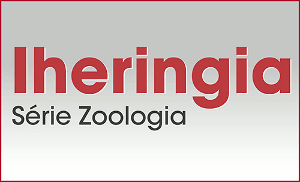The diet and feeding habits of armado catfish, Pterodoras granulosus (Valenciennes, 1821), were studied in the Lajeado Reservoir, Tocantins, Brazil, and the mouth of its tributaries. Stomach contents of 327 specimens were analyzed by the percentage composition and volumetric methods. The feeding of armado on a wide variety of foods, including both animal and plant items, leads to its classification as a euriphagic species with herbivorous tendency. However, it should be noted that armado showed a strong ontogenetic diet shift, with the gradual replacement of detritus and sediment by plant items, especially terrestrial ones. The environmental use pattern of P. granulosus corroborates the ontogenetic shift observed in its diet. Small fish predominated mainly in the benthic region and detritus and sediment represented an important resource, whereas large fish fed mainly on terrestrial plants, as they explore open water sites and the surface of the water column.
Feeding habits; seasonal shift; ontogenetic shift; habitat use







